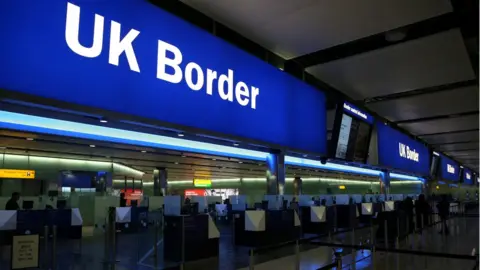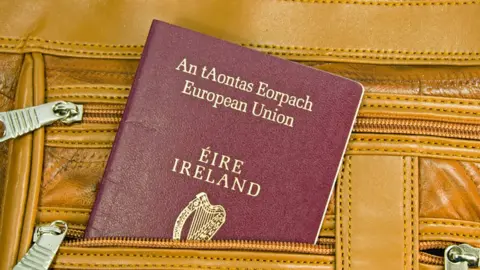Brexit: Call for new UK-Irish treaty on Common Travel Area
 Reuters
ReutersThe Common Travel Area is "written in sand" and should get legal certainty in a new treaty between Ireland and the UK, a report has concluded.
The study, by four legal academics, was prepared for the Northern Ireland Human Rights Commission and the Irish Human Rights and Equality Commission.
The Common Travel Area (CTA) gives UK and Irish citizens certain reciprocal rights in each others' countries.
The rights include largely unrestricted travel between each jurisdiction.
It is an arrangement between the UK and Ireland which pre-dates their membership of the European Union
The UK and EU have agreed that it can continue to operate after Brexit.
However, the report said the terms of the CTA are "much more limited than is often believed to be the case" and some of those terms can be unilaterally changed.
Open-ended residence
It points out that there is no legally binding international agreement which comprehensively establishes the terms of CTA.
It states: "It is a relationship built on trust. There is, however, no recourse to law if trust breaks down, or slowly erodes.
"The flexibility and informality of the CTA means that associated or dependent rights for individuals are vulnerable to modification through domestic legislation."
 Getty Images
Getty ImagesThe current version of the CTA has been developed since 1952 and at its legal core are immigration rules that each part of the CTA operates and enforces.
Those rules allow citizens of CTA countries to have open-ended residence in each others' countries.
Other rights flow from that including healthcare, employment and social security.
Immigration rules
The report said that while CTA-related, these arrangements are "not based on a bilateral binding agreement between the UK and Ireland and are therefore based on varying amounts of legal certainty".
It said the best way to give legal certainty would be a bilateral agreement that covered the core of the CTA and the related arrangements.
It also recommends a "notification requirement" for both governments and the devolved administrations to inform others should they introduce changes to domestic law or policy which could impact on the CTA.
Alternatives to a new comprehensive treaty could include an agreement on just the core immigration rules or a joint memorandum of understanding setting out the terms of the CTA.
